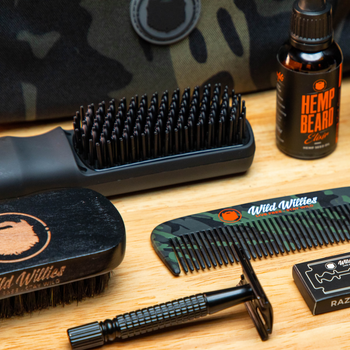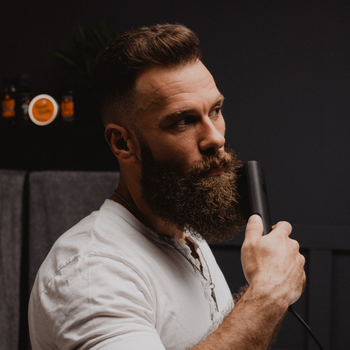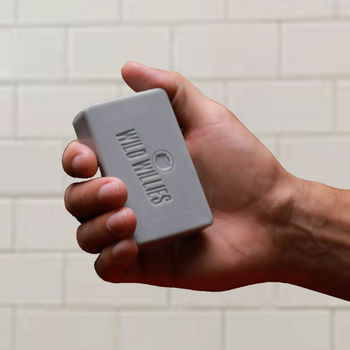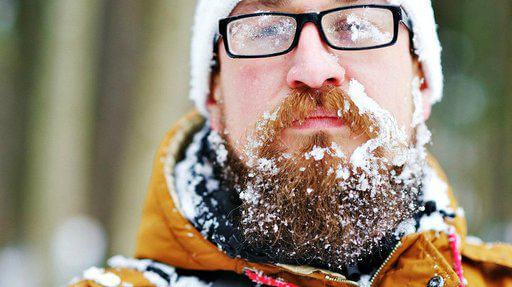Ready to geek out over beard wash? We looked up all the quality ingredients common among the top products in beard wash reviews so you don’t have to.
In this article:
- Moisturizers
- Foaming Agent
- Surfactants
- Fragrances
- Preservatives
- Miscellaneous Ingredients
Top Beard Wash Ingredients To Look Out For
Moisturizers
Moisturizers, or humectants, perform the double duty of hydrating your skin and delivering vitamins and minerals deeper into your skin's inner layers.
1. Aloe Vera

Try using aloe vera gel as a shaving cream and you’ll see how this plant keeps your skin supple and healthy. It is also effective for preventing razor burn and minimizing skin reactions due to shaving.
2. Argan Oil
Moroccans have long used this oil extracted from the nuts of the argan tree for its moisturizing and hair growth properties. It also prevents acne from breaking out and smoothens wrinkles.
3. Avocado Oil
Avocado oil's main use is to nourish the skin. Aside from that, people use avocado oil to help wounds heal faster, to manage psoriasis, and to relieve skin inflammation due to eczema.
4. Blackcurrant Seed Extract Oil

This oil works wonders for the skin by treating conditions like dermatitis and eczema. It’s basically a vitamin booster for your dermis (aka skin).
5. Beeswax
Beeswax combats bacterial infections and protects your beard hairs from wear and tear. It’s always a good ingredient to have in your beard wash.
6. Castor Oil
Castor oil is amazing at drawing moisture to the skin. It’s great as a beard wash ingredient because of its antimicrobial qualities and anti-inflammatory properties.
7. Coconut Oil

Coconut oil is not only an effective moisturizer, but also it is great at killing bacteria. It also penetrates your skin more than any other kind of oil.
8. Cedarwood Essential Oil
Aside from its relaxing scent, cedarwood essential oil can also promote hair growth.
9. Citrus Auranitfolia Oil
Citrus Auranitfolia Oil comes from key lime and works well as a moisturizer, cleanser, hair conditioner, mask, and as a tonic.
10. Cocoa Powder

Believe it or not, the ingredient behind chocolate is also good food for your skin, since it’s packed with antioxidants that help reverse skin aging. It’s not something you regularly look for in your beard wash but it's a definite plus when you see it listed among the ingredients.
11. Grapeseed Oil
Grapeseed oil contains more Vitamin E than olive oil and works best as a moisturizer. It also lightens skin.
12. Green Tea Extract
Green tea extract prevents skin aging and keeps the skin elastic and supple.
13. Hemp Seed Butter
Hemp seed butter is effective at reducing rough spots, resolving skin rashes, and preventing dermatitis—problems you’ll likely encounter while growing a beard. Keep an eye out for this ingredient in your beard wash.
14. Honey
Aside from feeding your skin with several vitamins and minerals like Vitamin E and Zinc, honey also works as an antimicrobial agent for burns and cuts.
15. Hydrolyzed Wheat Protein
Hydrolyzed Wheat Protein is an excellent moisturizer, which manufacturers create by isolating protein and amino acids from wheat.
16. Jojoba Oil

Jojoba oil works wonders for dryness and smoothens dry and frizzy beard hair. You're sure to feel the difference after a couple of washes.
17. Lavender Oil
Lavender oil soothes your skin and kills any zit-causing bacteria.
18. Lecithin
Lecithin disperses pigments into your skin and solves the problem of dry, flaky skin. It’s perfect for getting rid of beard dandruff.
19. Lime Extract

Its recorded benefits include the ability to help even your skin tone —somewhat of a problem among men.
20. Hydrolyzed Soy Protein
Hydrolyzed Soy Protein helps the skin retain more moisture and guards it against wrinkles and skin aging. It’s best to avoid any product with this if you’re allergic to anything with gluten or soy, though, as this is a soy flour derivative.
21. Olive Oil
Not only does olive oil moisturize your skin, but it also has potent antimicrobial properties. People from ancient civilizations basically slathered themselves in the stuff and called it skincare.
22. Orange Essential Oil

Enthusiasts claim the smell of orange essential oil alleviates depression, but aside from this interesting detail, it's adept at moisturizing and cleansing the skin.
23. Palm Oil
Compared to coconut oil, manufacturers make palm oil out of the flesh and kernel of the palm oil tree fruit. It is likewise rich in Vitamin E which makes it good for your skin. Because of its widespread use in cosmetics and commercial products, palm oil is a big business and a leading cause of deforestation in areas like Southeast Asia—something to consider if you fancy yourself a tree-hugger.
24. Panthenol
Panthenol, a B5 provitamin, coats and protects your hair from damage. This keeps your beard from looking wiry and frazzled.
25. Patchouli Essential Oil
Patchouli essential oil is particularly effective in preventing wrinkles and aged-looking skin. It also works well against dandruff. It gives off a very musky aroma which is pretty popular with the ladies.
26. Peppermint Oil
Peppermint oil freshens your skin and beats dandruff. Some men like its active cooling effect in their beard washes, too.
27. Rosemary Leaf Oil
What’s awesome about rosemary leaf oil is its ability to promote nerve growth, halt hair loss, and stimulate new hair growth.
28. Sandalwood Oil

Sandalwood oil is perfect for getting rid of itching, which is one of the more irritating problems you may encounter while keeping a beard.
29. Sea Fennel Extract
Sea fennel extract hails from a hardy plant found in rocky shores. The extract contains peptides which easily penetrate the skin and heal blemishes.
30. Shea Butter
Shea butter brings back the elasticity of your skin and stops beard itch. It’s definitely a must-have in your beard wash.
31. Soy Wax

It may be surprising to learn that soy wax actually moisturizes skin. It also functions as a thickener for your beard wash.
32. Tasmanian Seaweed Extract
The amino acids found in Tasmanian seaweed extract aid in maintaining youthful skin, so it’s a great bonus if you see this ingredient in your beard wash.
33. Tocopherol
Tocopherol is the pure extracted form of Vitamin E. You can keep looking young because this active ingredient combats skin aging.
34. Vegetable Glycerin
Vegetable glycerin can be found in coconut oil and soy oil. Shampoo makers use it as a humectant which is basically a solution that draws moisture to the skin. What’s great about vegetable glycerin is its ability to deliver active ingredients into the skin’s deeper layers.
35. Vitamin E Oil
To make this oil, manufacturers render and isolate Vitamin E from nuts and seeds like olives and almonds. Aside from promoting your skin’s health, it also has potent anti-inflammatory properties.
36. Water
Water is the most basic moisturizer around and thus manufacturers also use it in cosmetics.
Foaming Agent
Foaming agents bind to dirt, dust, and dead skin and thus help in getting rid of detritus on your mug faster when you wash the foam off.
37. Ammonium Laureth Sulfate (SLES)
Ammonium Laureth Sulfate is used as a foaming agent to get the stubborn dirt off your beard hairs. It can also be found in shampoo.
38. Ammonium Lauryl Sulfate (ALS)
ALS serves as a surfactant and a foaming agent. This chemical can be mildly irritating, so make sure you steer clear of your eye area.
39. Capryl Glucoside
Manufacturers render Capryl Glucoside from vegetable fat. It's often used as a foaming agent and a stabilizing solution for essential oils.
40. Caprylyl Glycol
Caprylyl Glycol plays well with both moisturizers and preservatives because of its double properties of keeping the skin moist while keeping microbes at bay.
41. Lauamid DEA
Aside from functioning as a cleaning agent in washes and shampoos, Lauamid also boosts foam.
42. Lauryl Glucoside

Lauryl Glucoside serves as an emulsifier and conditioner and works as a surfactant in most shampoos and washes. This ingredient hails from coconut and works to both nourish and repair hair.
43. Propylen Glycol
Propylen Glycol keeps cosmetics from melting and freezing due to high and low temperatures. It also serves as a delivery mechanism for nutrients to penetrate the skin deeper.
Surfactants
Surfactants add more volume to beard washes. They also reduce the surface tension of water and your skin so that water is more effective in rinsing things off your skin and beard.
44. Ammonium Xylene Sulfonate
You can find Ammonium Xylene Sulfonate in most cosmetics and soaps as cleansing agents.
45. Sodium Chloride

You might recognize Sodium Chloride as salt. Manufacturers include this in shampoos to add more body to their products.
46. Cocamidopropyl Betaine
Like Lauryl Glycoside, Cocamidopropyl Betaine comes from coconut and is widely used as a cleaning agent and a thickener for shampoos.
47. Decyl Glucoside
Decyl Glucoside is gentler compared to the other surfactants listed here, which is why it finds its way into baby shampoos and cosmetic products for people with sensitive skin.
Fragrances
Fragrances add pleasing scents to your beard wash and beard products.
48. Butylene Glycol
Butylene Glycol is a petroleum by-product which cosmetics makers use for fragrance and as a preservative to keep shampoos and washes from going bad due to humidity.
49. Fragrance
When you see fragrance as an ingredient, it’s basically a combo of chemicals that give cosmetic products their scents.
50. Linalool
Linalool will remind you of the smell of lavender and bergamot and thus this ingredient finds its way into aftershave lotions and men’s skincare products for its fragrance.
51. Limonene
Manufacturers extract limonene from the rinds of citrus fruits and add it to their products for fragrance.
52. Polysorbate 20

Manufacturers use Polysorbate 20 as a surfactant, and since chemists source this ingredient from coconut and berries, it also makes products smell good.
Preservatives
Preservatives extend the shelf life of a product by preventing the growth of bacteria and fungi. They also keep the product from being spoiled by the elements. If you're trying to live a greener lifestyle, you might want to avoid hygiene products with any of these ingredients.
53. Diazolidinyl Urea
Diazolidinyl Urea provides shampoos and cosmetics with antimicrobial properties. However, some studies suggest a link between this chemical and allergic reactions.
54. Methylchloroisothiazolinone
Methylchloroisothiazolinone, or MCI for short, guards cosmetic products against microbes, fungus, and bacteria.
55. Methylisothiazolinone
Methylisothiazolinone works as a preservative and increases the shelf life of products. Some researchers consider this chemical dangerous because it has neurotoxic and allergy-triggering effects.
56. Methylparaben
Manufacturers add methylparaben and other parabens into beard wash and shampoo to combat fungus and mold so these products last longer. A note of caution though: Some studies cite parabens for potentially increasing the hormone estrogen and exposing users to cancer risk.
57. Potassium Sorbate
Potassium Sorbate works as a preservative and serves as an alternative to parabens. Because of its mild germ-killing action, manufacturers supplement it with other preservatives for better protection.
58. Phenoxyethanol
Phenoxyethanol has two main uses: a fragrance stabilizer and a preservative. This chemical has strong germicidal properties and also serves as an ingredient for insect repellents. The EU and Japan restrict the use of this substance to only 1% in cosmetics.
59. Propylparaben

Propylparaben preserves your beard wash by preventing the forming of microbes in the product. It is also considered a paraben and thus researchers are investigating its links to cancer.
60. Sodium Benzoate
Sodium Benzoate functions as a preservative. Its ability to interact with Vitamin C and Potassium Benzoate makes it potentially harmful because they form the carcinogen Benzene.
61. Sorbic Acid
Sorbic Acid and its derivatives, like Potassium Sorbate, kill yeast and bacteria, thus preventing them from contaminating cosmetics. This ingredient can potentially trigger allergies.
Miscellaneous Ingredients
62. Citric Acid

Manufacturers add Citric Acid to adjust the alkalinity vs acidity of the product. You can find this compound in lemons and oranges, which gives them their sour zing.
63. Potassium Hydroxide
Also known as lye, Potassium Hydroxide helps clean hairs and serves as a counterbalance to the acidity of other ingredients.
64. Xanthan Gum
Xanthan gum’s function in most cosmetics is to add more viscosity to fluids and bind the other ingredients together.
Check out this Wild Willies Beard Wash & Rinse review by Tools of Men:
Now you have a perfect idea of what components you may find in a beard wash recipe. Beard shampoo is an important tool in keeping your beard healthy and works in different ways that distinguish it from the wash you use on your scalp. But as you can see, not all ingredients are created equal and not all are necessarily good for you. Use this article as a guide and read the label before investing in a beard wash. You can look like a bearded badass without compromising your health or the environment.
What beard shampoo do you use? Do you see any of its ingredients listed here? Give us your answers in the comments section below.
Up Next: Beard Grooming Basics That Take Less Than 5 Minutes
Feature Image by johncage06/Instagram






